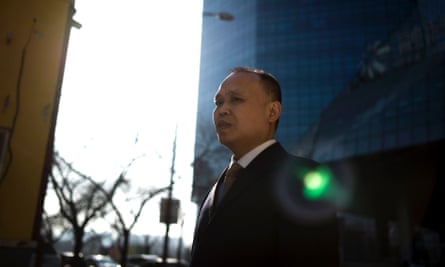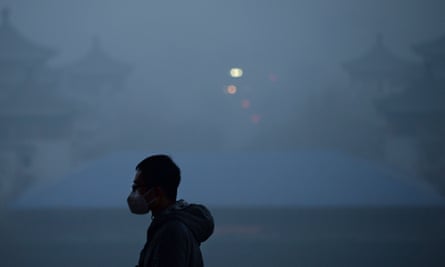Who is responsible for China’s chronic and deadly air pollution? That depends on who you ask. Officials blame the weather or outdoor barbecues, activists blame steel companies and coal-fired power plants. But Yu Wensheng blames only one actor: the government.
The 50-year-old lawyer recently launched an unprecedented suit against the authorities in three regions in China, claiming they have failed in their responsibilities. For a government with the motto “Serve the People”, Yu feels the officials are serving other interests by allowing nearly half a billion people to choke on toxic smog.
“Our bodies are being harmed because of the ineffectiveness of our government; because of their inaction and carelessness, we suffer,” Yu told the Guardian. “The pollution has affected my family, my son is coughing, I’m also coughing, and I feel the smog caused this. I am suing as a victim.”
Northern China is frequently blanketed with thick clouds of deadly smog that is linked to almost a third of all deaths in the country – and caused by steel plants, a heavy reliance on coal for heat and power generation, plus millions of cars. While the authorities have “declared war on pollution”, many feel progress has been slow and the region is still hit with a yearly bout of “airpocalypse”.
Yu and four other lawyers have filed cases against the governments of the capital Beijing, the neighbouring port city of Tianjin, and Hebei province, home to some of the country’s most polluted cities.
“If the authorities don’t accept the case or use some other method to dismiss it, it can only show the government has a bad attitude in the face of pressure from the citizens,” Yu says. “That would clearly show they don’t serve the citizens at all.”
Several in the group have been pressured by local branches of the justice ministry to withdraw the cases and another lawyer has already dropped out after he was visited by police in his hometown. But Yu is undeterred, having previously spent stints in detention, where he says he was tortured.
President Xi Jinping has made building “rule of law” a hallmark of his tenure, but critics say the ruling Communist party remains above the law and ordinary citizens still struggle for justice. The country’s top judge rejected the idea of judicial independence in a speech last month, dismissing it as a “western” notion.
In the wake of the lawyers announcing their lawsuit, China’s powerful censorship authorities issued a blanket ban on any discussion of the case – a rare edict for an environmental issue. In recent years the government has allowed some space for citizens to vent their anger over the country’s chronically toxic air.

Even government media frequently publishes articles lamenting pollution. In the midst of a week-long bout of bad air in the beginning of January, the state-run China Daily published an editorial lambasting the government for not doing enough to tackle the problem.
“No matter how much importance the government says it has attached to pollution control, no matter how many efforts may have actually been made in this regard, the heaviest smog that has extended for the longest time and covered the largest number of cities in years flies in the face of the country’s fight against environmental pollution,” the paper wrote.
Environmental suits have been successful in the past, particularly civil cases suing for monetary compensation. A Chinese court ordered US oil giant ConocoPhillips to pay damages to 21 fisherman who claimed their livelihoods suffered after a spill at an oil rig operated by the company.
China allowed nongovernmental organisations to sue companies in 2015, with the goal of civil society taking a greater role in holding polluters accountable. NGOs with government affiliation and backing have been much more likely to have a case accepted by courts than independent groups.
But one of Yu’s colleagues sees little point in targeting companies.
“We have to sue the government,” says Cheng Hai, another lawyer involved in the case. “A business can only control the emissions from its factories, but the government can reduce emissions across all the polluting industries. We have laws, regulations and systems to combat pollution, but they’re not being enforced.”

Their initial attempt at filing the case was rebuffed by a Beijing court, with court officials saying a case against each government needed to be filed separately in each location.
“There’s no point in just suing one government, such as Beijing,” Cheng says. “This is a regional problem and all three governments need to be held accountable for there to be any effect. If we don’t sue, the air will just get worse.”
The lawyers have since refiled their cases and are waiting for a response. But even if the court agrees to hear the cases, the chance of a landmark victory is almost nonexistent.
“This lawsuit on this topic at this moment in history is going to be an uphill battle,” says Rachel Stern, author of Environmental Litigation in China: A Study in Political Ambivalence. “I would be surprised if this lawsuit is successful, and if I were betting, I don’t even think it will get accepted by the court.”
For the first 15 years of his law career, Yu shunned political cases, instead practising corporate and civil law. But in 2014 he staged a one-man protest, standing outside a Beijing detention centre for hours after he was barred from visiting a client held there.
Two days later, police took him away. He would not emerge for more than three months, while interrogators accused him of supporting pro-democracy protests in Hong Kong, which were at the time clogging the city’s financial centre with hundreds of thousands of people.
“I really had nothing to do with the Hong Kong protests, but those 99 days changed my entire life,” Yu says.
Once he was released, Yu put aside many commercial cases to focus on defending human rights, and was detained again in 2015 as part of a nationwide crackdown on human rights lawyers and activists.
“When I became a lawyer, I thought could contribute to society,” he says. “But after practising law, I found that it was not like that at all – because China is not a rule of law society, but a rule by law society.”
Guardian Cities is dedicating a week to investigating one of the worst preventable causes of death around the world: air pollution. Explore our coverage in The Air We Breathe and follow Guardian Cities on Twitter and Facebook to join the discussion









Comments (…)
Sign in or create your Guardian account to join the discussion